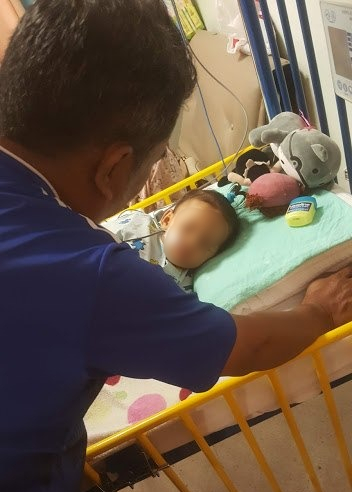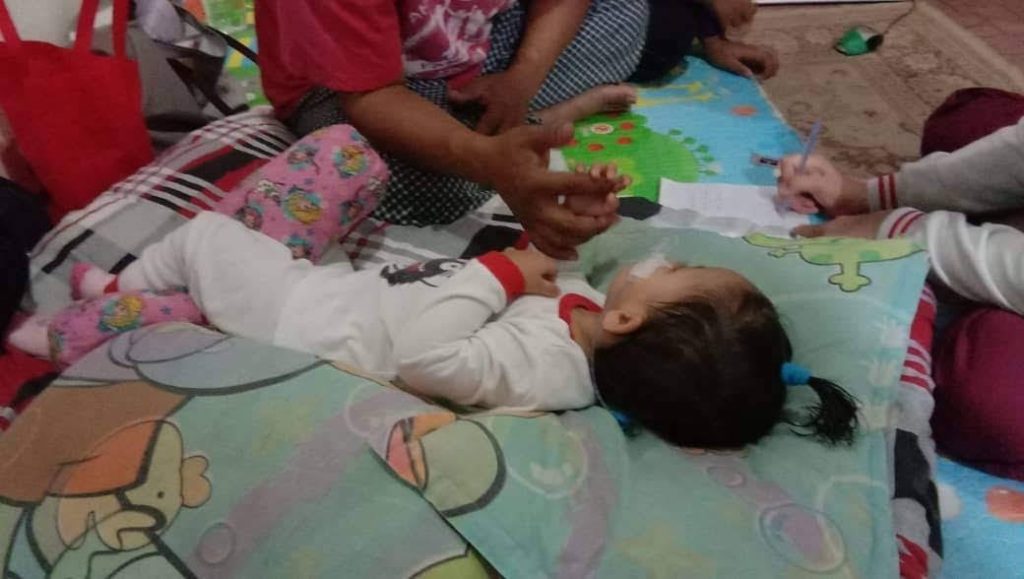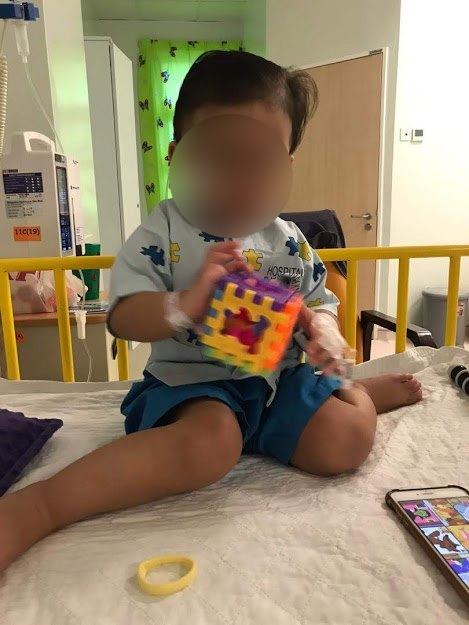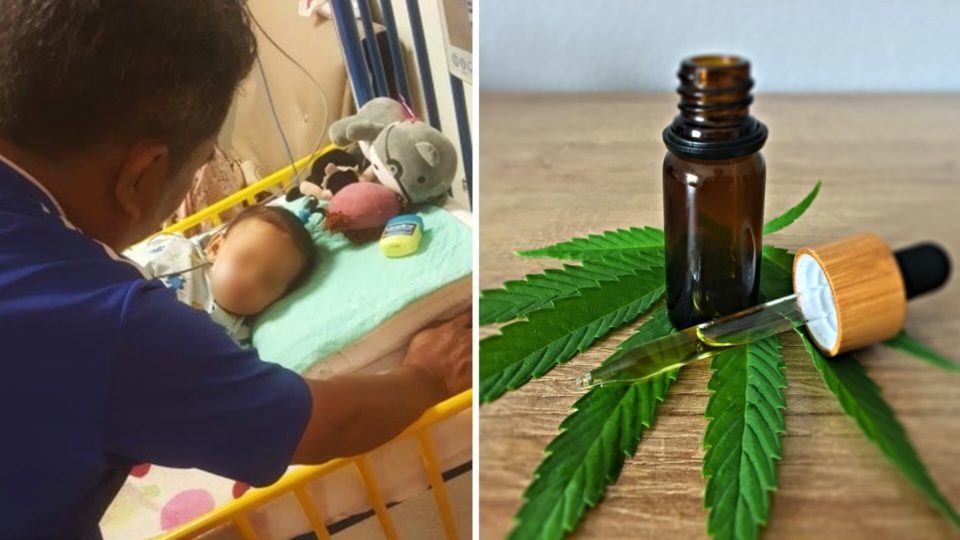One. Two. Three. Four. Five.
Drops of cannabis oil fell onto Ira’s small tongue as she lay motionless on a mattress, her heart beating slower than normal.
The earthy scent of the medicinal oil filled her home in rural Janda Baik, Pahang, as her father Pokleh, 36, carefully fed the one-year-old with the illicit substance secretly bought from a supplier in Thailand – a risky move that could see him jailed in Malaysia.
But his love for his child, who was fighting for her life after being paralyzed by brain tumors, was greater than his fear of state punishment. Pokleh and his wife asked that their real names not be used for fear of prosecution. But he wanted to share his story because of the dramatic recovery he says cannabis made possible for his daughter – and could provide other children.
Two Novembers ago, Ira suffered a high fever that lasted about a week, leaving her unconscious. Anxious, Pokleh and his wife Anna, 34, rushed their daughter to the hospital, where doctors found lesions in the baby girl’s brain known as cavernoma – a rare condition in which blood vessels form abnormally. There were no answers to what had caused it. Ira neither had a history of seizures nor family members with brain-related illnesses.

“I thought it was just a normal fever,” Pokleh said. “I thought she’d be okay after a while. It’s my fault for not getting medical attention sooner.”
Ira spent three weeks in the intensive care unit of an urban government hospital, while doctors treated her symptoms – seizures and muscle spasms – with generic drugs used to treat neurological disorders. Pokleh objected to surgery because Ira’s chance of survival was low, medical documents showed. For nearly a month, Pokleh watched as his daughter lay paralyzed on the hospital bed. His wife was already conceding the reality that her daughter may never be able to walk or talk again.
“Why us?” Pokleh, an IT consultant, said as his voice cracked in a recent interview. “Only God knows how we managed to stay strong when the doctor diagnosed Ira with a brain tumor. My wife was five months pregnant at that time, I needed to be strong for her too.”
Tears rolled down Ira’s cheeks as she glanced from her mom to her dad, and the cartoon on the hospital’s television screen, he recounted.
“I could not accept my daughter’s condition,” Pokleh said. “Before this, she could run, she could do everything. I felt so helpless. I needed to do something about it. I just had to. There has to be another way.”
I first spoke to Pokleh in March. At that point, Ira’s condition was in remission and she had regained full use of her body, an improvement Pokleh credits to one thing – cannabis. He agreed to discuss his experience in hope that other parents might benefit, but asked that we not show Ira’s face.

Discovering cannabis oil
Soon after Ira was admitted to the hospital, Pokleh concluded that modern medicine could not improve his daughter’s condition. So he looked for alternatives, trawling through hundreds of books, articles and documentaries before discovering Weed The People on Netflix.
The show followed several parents in the United States on a quest to treat their cancer-stricken children with cannabis. The show was meant to “entertain and inform” and not serve as medical advice. But Pokleh decided to take it up – even though it remained illegal in Malaysia despite calls for reforms.
Tania Scivetti, a member of the Malaysian bar who has defended people accused of drug offenses, said the government’s view of cannabis as “hard drugs” could be why it is reluctant to decriminalize it, adding that Malaysia “should take the cue from other countries with successful cannabis policies.”
Getting ahold of cannabis oil was easier than Pokleh expected. All it took was ordering it from a Thai supplier on Facebook, and it arrived within three days, just in time for Ira’s return from three bedridden weeks in the hospital. One palm-sized bottle was enough for 50 servings, the label said.
Little has been studied about cannabis oil in Malaysia, while research done elsewhere in the world has not been conclusive. Cancer Research UK says that cannabis oil comes from the flowers, leaves, and stalks of the cannabis plant. Unlike CBD or cannabidiol oil, it also contains the psychoactive compound that gives people a high called tetrahydrocannabinol, or THC.

“Cannabis is a safe medicine for people with seizures,” said medical marijuana advocate Sathivel Ras Thaman, 38, who has been practicing medicine for 12 years and runs the Medira group of clinics here.
“Cannabis oil would be derived from the cannabis plant, while CBD oil is extracted alone, without other properties like THC,” he said in a May interview. “Most CBD oils in the market are derived from industrial hemp, which has a naturally low THC content (below 3%). If the cannabis oil has THC, it comes with a caution that it will make [the user] high.”
Pokleh stopped the medication that was prescribed by the doctor to avoid mixing them with the cannabis oil. After bringing her home from the hospital a month later, he kept up a routine of feeding Ira five drops of the oil each day, prying open his daughter’s mouth to give her the daily dose.
As days turned into weeks, Ira started making subtle movements. She clenched her fists, lifted her legs, and slowly turned her little body while lying on the mattress. Eventually, the toddler was able to crawl again.
“Before we started on cannabis oil, she just lay down, motionless. No reflexes. It felt slow, but day by day, she was getting better,” Pokleh said. “From what I’ve read and watched online, a major side effect would be sleepiness … But nothing harmful.”
Proud of his daughter’s fighting spirit and determination to keep “trying every day, patiently,” Pokleh’s eyes sparkled with joy as he said: “Our little Ira is back.”
“If she couldn’t lift her legs one day, she would keep trying until she succeeded,” he said. “Soon, she could walk, run, and play with our pet cat. She could also eat normally, even though there was a tube attached to her nose.”

Meeting the doctor again
It was three weeks after Ira started on cannabis oil, just before the first COVID-19 cases had reached the nation, when it was time for her to see the doctor again. But how would Pokleh explain her recovery? Mentioning cannabis oil was out of the question. On the other side of the country, a military retiree was facing the gallows for cultivating cannabis for sale to terminally ill patients. The risk of capital punishment is real in Malaysia, where the substance is classified as an illegal drug under the Dangerous Drugs Act 1952. Depending on the weight of the drug, penalties range from a fine to imprisonment, caning, and even death.
At the hospital, the family arrived in high spirits, with Ira wandering about on her feet and chattering merrily with strangers — a completely different patient from the one who had been discharged. When they met the doctor, Ira played with a calculator and stethoscope while the doctor checked her reflexes and later took her for an MRI scan.
Images from the scan showed an impressive improvement in Ira’s condition, according to Pokleh. The lesion in Ira’s brain had shrunk considerably. When questioned about Ira’s recovery, Pokleh commended the doctors and other healthcare workers who helped. The doctor listened in disbelief but never prodded further.
“It’s almost like the doctor did not believe it. We just said it was thanks to the hospital, doctors, and nurses who worked so hard to help Ira heal,” he said.
“I did not feel comfortable disclosing anything because I could be accused of committing a crime, but as a dad, I didn’t have a choice. I wanted to see Ira get well, and be healthy just like other kids,” he added, grateful to have been given a “second chance” to be with his daughter.
Today, a year later, Ira is 3 and seems to have no memory of what she went through. But she still takes at least one drop of cannabis oil every day and will continue to do so as long as the tumor remains in her brain.
“I’ve asked her before and showed her photos from the hospital, ‘Do you remember this? Your ummi (mother) was so heartbroken, she was waiting for you to wake up,’” he said.
Hardly a day goes by without Pokleh worrying that Ira will relapse, especially now that she is slated to start kindergarten.
“I’m only afraid of when she jumps around – she may hit her head, which could potentially reactivate the tumor … I know I can’t always be there to watch her, so when she goes to kindergarten, I hope the teacher can keep an eye on her while she plays with her new friends.”
Other stories to check out:
UN’s reclassification of cannabis as less dangerous drug won’t change Malaysian laws: Home Minister
Sabah woman’s year in U.S. weed biz sparks hope for Malaysian marijuana




